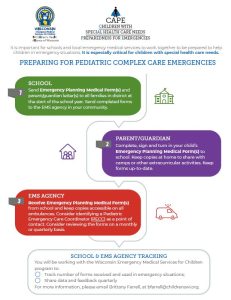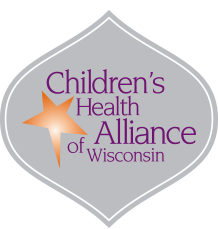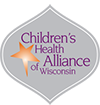Written by Ben Mulick

This month, I’d like to call special attention to a program that I’ve been working with since I started my service at Children’s Health Alliance of Wisconsin (the Alliance) in October: Children with Special Health Care Needs Preparedness for Emergencies (CAPE). CAPE is part of the Alliance’s emergency care initiative’s Wisconsin Emergency Medical Services for Children (WI EMSC) program, and helps schools and EMS agencies collaborate to be more prepared for medical emergencies involving children with special health care needs. Schools and EMS agencies share health information about students on forms that families voluntarily fill out, allowing EMS personnel to access important information about a child’s needs before they arrive on the scene of an emergency.
Now that you have the basic idea of what CAPE is, I’d like to say a little bit about why I’ve chosen to spotlight this program. This blog is primarily meant for people who will serve with the Alliance in the future, whether they’re AmeriCorps members like me, interns, or students. CAPE is a great example of the kind of work I would encourage those in roles like mine to pursue in the future. With that in mind, what kind of work do I get to do with the CAPE program, and what makes it a great example of a program you should pursue?
First, CAPE is very simple and intuitive: schools send forms to families, families fill out and return the forms, schools share the forms with EMS agencies, and EMS agencies put them to use. Even without previous experience with similar programs, CAPE is easy to understand and easy to explain to others. Projects like this make for great opportunities because they allow those new to the Alliance to hit the ground running.
Second, projects like CAPE offer the opportunity to communicate with partners outside of the Alliance. A lot of what I’ve done for CAPE has been focused on outreach: I’ve been able to meet with EMS agencies, school administrators, and other organizations to explain the program and encourage participation. Getting comfortable speaking to others confidently is important, and as an added bonus, speaking with outside partners is a great way to see how your work impacts outcomes more directly.
Not every project for AmeriCorps, interns, and students will look exactly like CAPE or be useful in the same way. The most important thing for those doing this work, is to always be on the lookout for new things to tackle. The best way to find projects where you can do useful work and develop your skills is to dive into new types of work whenever you see the chance! There are more aspects my work to explore, and I hope you’ll join me for more with the next installment of our blog!

